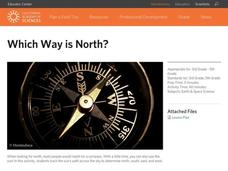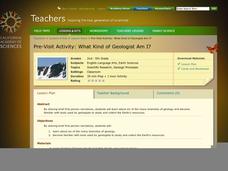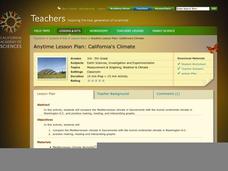Scholastic
Study Jams! Minerals
All that glitters is not gold! In this nine-slide show, your mineralogists gain insight on the formation and properties of the building blocks of rocks. Beautiful and sparkling photographs make the presentation pleasing to the eye, and...
Scholastic
Study Jams! Fossils
By viewing and reading these slides, your precious paleontologists learn what makes a fossil and what scientists can learn by studying them. Consider giving the website to pupils as homework. They can read the slides, take an assessment...
Scholastic
Study Jams! Sedimentary Rocks
Fascinating photos of sedimentary rocks and formations supply a brief overview for your geology class. By viewing these slides, learners discover that sedimentary rocks are made of tiny bits of rock, dirt, or shell that have settled,...
Scholastic
Study Jams! Igneous Rocks
Dynamic music pumps up viewers as they learn about intrusive and extrusive igneous rocks. Presentation slides include a graphic depiction of magma below Earth's surface , photographs of lava exploding and flowing, and close-ups of...
Scholastic
Study Jams! Metamorphic Rocks
Photographs of magnificent metamorphic rock formations make up the bulk of this brief slide show. Along with the upbeat background music, slow-moving slides, and informational captions of the slide show, you will also find key...
Scholastic
Study Jams! Soil
Seven superb slides sharpen science students' scoop on soil. In viewing them and reading the accompanying captions, your class will uncover the importance, different types, horizons, and protection of soil. They can then assess their new...
Scholastic
Study Jams! Natural Resources
Use this slide show to introduce your class to some of our most useful natural resources. The text beneath the photographs differentiates between renewable and non-renewable resources. The need for conservation of resources and human...
Scholastic
Study Jams! Fossil Fuels
Eight slides introduce viewers to the wonders and woes of fossil fuels. How are they formed? How do we use them? How do they harm the environment? And how can we conserve? All of these thoughts are briefly touched upon. In addition to...
Curated OER
Using Vegetation, Precipitation, and Surface Temperature to Study Climate Zones
Using NASA's Live Access Server, earth scientists compare the temperature, precipitation, and normalized difference vegetation index for four different locations. They use the data to identify the climate zone of each location using...
Institute of Electrical and Electronics Engineers
Making Sense of Sensors
Have small groups in your class construct working hygrometers as an example of the benefits of using sensors in engineering. This activity can be used during a weather unit when covering humidity or in a STEM activity as a preparation...
Earth Day Network
Conserving Water Through Art!
Having fresh, clean drinking water is a privilege many people take for granted. Help raise awareness about the scarcity of water and the importance of conservation by discussing different ways water is used in everyday life. Brainstorm...
California Academy of Science
Which Way is North?
Who needs a compass to find cardinal directions? Just place a stick in the ground and record the movement of its shadow over the course of a day. Then, measure the shadow lengths in order to determine a north-south line. A simple...
Baylor College
Water: Post-Assessment
Very simply, the science class will discuss what they have learned during The Science of Water unit and take a multiple-choice post-assessment quiz. A few other closing activities are suggested for you to choose from, such as having...
Baylor College
What is Air? Pre-Assessment
First, estimate existing knowledge about air with a class discussion. Then, hand out a 10-question pre-assessment quiz to record how much pupils know to compare to their knowledge later. This will also give mini meteorologists the...
Odyssey of the Mind
Odyssey of the Mind Curriculum Activity: From a Distance
Challenge your class with an amazing set of ideas that really put the project back into project-based learning. It all starts with a whole class research task. Each learner will look up and take notes on multiple facets of things that...
Baylor College
What's Is Soil Made Of?
It's time to roll up those sleeves and get a little dirty in the second lesson plan of this series on the science of food. Investigate where plants and animals get the minerals they need to live in this two-part exploration of soil....
California Academy of Science
Natural Resources Bingo
Bingo isn't just a silly game, it's a great way to practice all types of skills. After reviewing that the earth is composed of natural resources, what those natural resources are, and sustainability, the class plays a game of bingo. The...
Vosonos
Interactive Minds: Solar System
Travel through space as you learn about the galaxy, solar system, planets, and much more. An extensive resource for studying astronomy in upper-elementary and middle school classrooms.
California Academy of Science
What Kind of Geologist Am I?
Transform your class into young geologists as they learn about six different branches of geology. Using the included geology career descriptions and picture cards, learners work in small groups deciding which tools and locations fit...
California Academy of Science
California's Climate
The United States is a large country with many different climates. Graph and analyze temperature and rainfall data for Sacramento and Washington DC as you teach your class about the characteristics of Mediterranean climates. Discuss the...
Baylor College
Why Is Water Important? Pre-assessment
This water worksheet is just the tip of the iceberg! It a multiple-choice quiz meant to be a pre-assessment for a wonderful water unit. There are 10 questions to be answered regarding the role, properties, and behavior of water. Make...
Scholastic
Study Jams! Renewable Fuels
A single slide introduces each of the following renewable energy sources: hydroelectric, wind, geothermal, solar, tidal, and biomass. This provides a succinct overview that you can use as a visual aid when you first introduce alternative...
Baylor College
Post-Assessment: Global Atmospheric Change
Find out how much your earth scientists learned about the atmosphere in the unit on global atmospheric change with this assessment. After writing a letter to persuade others to make changes to protect our atmosphere, pupils take the same...
Baylor College
Pre-Assessment: Earth's Energy Sources
A ten-question, multiple-choice quiz assesses what your elementary earth scientists know about the atmosphere both before and after a unique unit on global atmospheric change. Make sure to check out the activities and lesson plans...

















